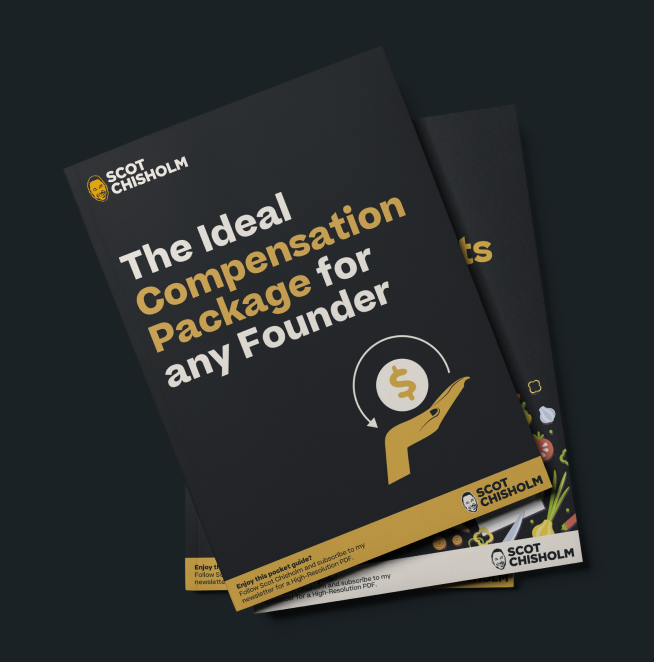
Written by Scot Chisholm
| Founders | November 17, 2023

Any of this sound familiar?
This is the everyday life of an entrepreneur and founder. I know because I’ve gone through it 3 times!
And the reality is most founders fail. The odds are not in your favor. For new startup founders especially, success is like navigating a minefield with a blindfold on.
So, after 20 years of leading and investing in startups, I collected some of my top lessons for new startup founders. Lessons that I wish someone had taught me when I was first starting.
Ready? Here we go…
Every startup founder thinks they’re focused, but they’re not.
The truth is they’re juggling 100 things at once, and they’re creating incredible complexity and confusion for their team. When every idea is a good idea, soon nothing matters.
I know this lesson all too well. One of the biggest startup founder mistakes I made early on was setting too many company goals. I had 10 annual company goals in the early years but eventually learned that anything over 3 was too much. Focus deteriorates rapidly after three.
Here’s what I do now:
Once your goals are set, it’s important to communicate them to your team early and often. Every team member should be able to rattle them off at any given time. Not only that, they need to know HOW you’re doing against each goal at any given time. This should become part of the fabric of the team on an everyday basis: highly accessible and self-reinforcing.
Bottom Line: Always cut through the noise and create clarity for your team. Focus on 3 or less goals, and you’ll be way ahead of most new startup founders.
Most startup founders confuse charisma for leadership.
They don’t realize that higher-level leadership needs to be learned over time. They assume that their innate abilities (which many startup founders have) will suit them through the many phases of building their startup. This rarely happens, if ever.
One of the first steps in becoming a great leader is recognizing your own blind spots. It may be a difficult pill to swallow, but the truth is the number one threat to your company is you.
Spotting these weaknesses is often the difference between success and failure.
Learn more on how to avoid these blind spots here.
Learning to lead also means keeping Purpose, Direction, and Progress in your crosshairs. I use and coach this philosophy with all of my CEO / founder clients.
You (and your team) should be able to answer these questions at any time:
Bottom Line: As a startup founder, leadership is in your DNA. But the most successful startup founders recognize that there’s always more to learn. By focusing on developing your leadership skills, you won’t be chasing, your personal growth will keep pace with company growth.
Harsh truth: If you build it, they WON’T come.
A product alone almost never sells itself without proper sales & marketing. Even product-led growth (PLG) is usually fueled by excellent marketing.
Start with founder-led sales. No one knows your product better than you, which makes you the best person to take your story to market. Not to mention, the takeaways are priceless (product feedback, pricing optimization, etc.)
And remember, your product doesn’t need to be perfect before selling it. Reid Hoffman has a famous quote:
But also remember, your product is only half finished without a distribution (sales and marketing) plan.
Approach distribution like another version of your product–you have a v1, v2, and v3 version of your Go-To-Market (GTM) plan. Each comes with a hypothesis on what you think will work (inside vs. outside, high price vs. low price, etc.). Then, test iteratively, find the channels that work best, and go all in.
Once you find your target audience and people want to buy your product, it’s time to hire additional salespeople. But start small (two is a good sweet spot).
Two sales reps will give you the opportunity to A/B test your sales strategy. By only hiring one, you run the risk of drawing inaccurate conclusions about your market. And more than two is (very likely) too costly to start.
Learn more about when and how to start hiring sales here.
Bottom Line: Products don’t sell themselves. You need a strong marketing & sales plan. Start thinking about this early on. And, become the first salesperson as a founder to learn what works and what doesn’t.
Most startup founders don’t actually own their own calendar.
It gets invaded by everyone else’s needs and meetings and turns into a scattered mess. This leaves you with little time for your own work and future planning. Never mind the time necessary to give your brain a rest.
Today, I have 80%+ more free time because I stick to these five hard rules for managing my calendar:
Part of taking control of your calendar also means laying strict ground rules on how meetings are run at your company. Otherwise, they quickly become a colossal waste of time.
I have found these 8 tactics to be the most effective in not sucking the life out of everyone:
I dive deeper into each of these tactics here.
Bottom Line: One of the most glaring obstacles to building a successful startup is avoiding burnout for you and your team. That starts with closely managing your calendar and eliminating meetings that waste everyone’s time.
Most startup founders are terrible people managers.
They’re builders at heart and used to doing everything themselves. So, most founders struggle to empower a team to solve problems on their behalf. They want to be involved in everything
But as the organization grows, the founder needs to figure out how to scale themselves – and that means becoming a kick-ass people manager. Or, at the very minimum, hiring others who are kick-ass people managers.
For me, I immediately turned to books, podcasts, and videos to level up my management skills. There’s so much free information out there; this is a fantastic place to start. You’re already reading this blog, so… you get the idea.
Join my CEO Accelerator: Anyone can become a founder. But only the top 1% will become truly world-class. Make that someone you.
And a huge part of becoming a great manager is recognizing any toxic behaviors in yourself (and in other managers) and weeding them out across your company.
Here are 5 things to avoid:
Bottom line: Becoming a founder doesn’t mean you know how to manage people in the right way. You need to work at this, and it’s best to start right away.
People will care 10x more about company goals if they’re paid for it.
Most raises (merit increases) are based solely on individual performance–how the person did over the course of the year, usually ending in some sort of annual performance review. So, what do you think the person is going to focus on throughout the year? The company’s top 3 goals or the individual things they know will increase their chance of getting a raise each year? Clearly, the latter.
This might seem obvious when reading this post, but most companies’ comp design incentivizes individuals to focus on themselves and not the company. This creates splintered focus across the entire organization and decreases the likelihood that the company achieves its goals.
Instead, each person’s compensation should somehow be tied to the company achieving its goals. This creates a win-win culture and, over time, is WAY more motivating for everyone involved. It feels like a true team sport, not a random collection of individual players.
The most common and easiest way to do this is by implementing a company-wide bonus plan that every person is tied into. The bonus is paid out as follows:
And they can still earn part of their bonus if they hit some, but not all, of the goals.
So, looking at the total comp package, I would structure it like this example (below). Assume the market rate for this role is $70k.
So, the base salary is a bit below market, but the earning potential is well above market. So, if the company and the individual do well, they can earn 14% more than the market rate for their position. If it’s an average year, they will likely land right around $70k for the year (the market rate). They would only earn less than the market if both the company and the individual were performing well below average.
Bottom line: Don’t assume that your team is actually focusing on the company’s goals. In most companies, this is set it and forget it. But if you tie company goals to their comp, you can bet your ass they’ll pay close attention!
Building a new startup doesn’t mean living off ramen noodles forever.
Sure, staying lean in the very beginning is usually a good thing. But struggling to make ends meet shouldn’t be a founder’s rite of passage. It’s actually detrimental to the founder’s health & wellness, which only hurts company performance.
Instead, you should treat yourself like a professional athlete (and, if you have a board, they too, should treat you like a professional athlete). This means compensation for performance; and some sort of allowance to maintain optimal health.
Just imagine if a professional athlete had to worry about paying rent, never worked out, and ate like crap. Would you expect that person to perform at his or her best? Of course not. And it’s really no different for startup founders.
Luckily, I obsessed over this issue for years and finally pitched my board a win-win package that I believe is ideal for any founder.
Keep in mind the actual numbers can be adjusted depending on:
Base salary should be relatively modest and help the company conserve cash. It should also align with the stage of the company like this:
You should be able to double your pay by hitting the company’s top 3 goals for the year. This is the definition of pay for performance.
Stretch goals go beyond the normal course of business and are typically forward-looking goals and/or Board priorities that only the CEO can accomplish. Examples include:
Self-care is almost always overlooked, but it shouldn’t be. Professional athletes have strength and nutrition plans, so why shouldn’t you?
Get your Board to fund:
You can start small and grow into it. But don’t make the mistake of not considering health a piece of overall comp.
6 simple health hacks that changed my career forever, including some of my favorite supplements!
Bottom line: If you don’t advocate for yourself, no one else will. I encourage you to pitch this exact compensation package to your Board. Reach out to me and let me know how it goes!
—
Are you a founder, executive, manager? I’d love to support your professional growth.
Here’s three ways:
Join 100,000+ leaders getting the blueprint to go from $0 to $100M.
If you watch one thing this week, this should be it 👇 Ever feel like you’re working your ass off, but not making any real progress? It happens to the best of us. In the...
Founders, Leadership | May 17, 2024
It’s all about incentive alignment… Most companies screw up compensation design. They struggle to balance base pay, bonus pay, and sales commissions – either making things too complex (you need a PHD to understand your...
Founders, Ops | April 19, 2024
You are what you schedule. As a leader, your time is your most valuable asset. So, the difference between good and great leadership is how you use your time. That makes your calendar one of...
I'd love to learn more about you to better customize the tips I send, ensuring they are as relevant and helpful as possible.


Hi, I’m Scot — Join 100,000+ leaders getting
the blueprint to go from $0 to $100M.